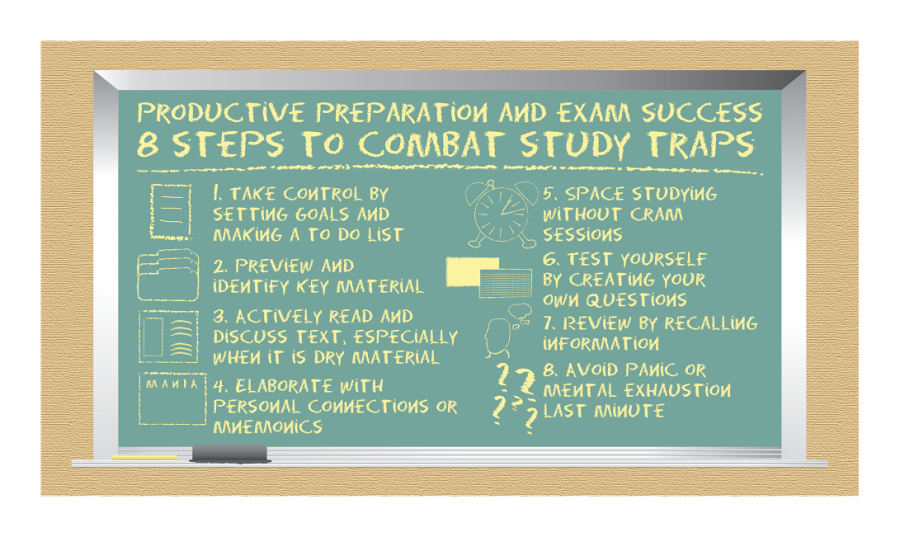Productive preparation
Handling exams efficiently before winter break
Source: Missouri State University Learning Commons
December 7, 2016
For the first time in more than 10 years Coppell High School students will be taking exams before winter break. Without two weeks of break to study, many students find themselves overwhelmed. These seven study tips, compiled from various reputable corporate organization and universities, will make preparations more productive.
Have a goal in mind
Mind Tools, a management and leadership training company, suggests a primary step to success is setting specific, measurable goals. While you may have a vague idea of wanting to do well, try to set a more distinct goal. For example, if you know you want as 90 for the semester, you can calculate the exact grade you need for the exam and aim a little higher. Coppell High School policy weighs each six weeks as two-sevenths of your final average and the exam as one-seventh.
Organize notes, compile study material
According to Rust College’s tips on note taking, unorganized notes can be as bad as not having any notes. With daily lectures, projects and assignments, you may be overwhelmed with all the different course material you could use to study. Unorganized notes will only worsen this feeling of ‘there’s too much to know.’ Organize your notebooks, folders and worksheets by topic and clean out any assignments/projects that will not be helpful.
Form study groups
While it is important to remove distractions such as social media or texting, finding a focused study group can be a positive influence. Education corner lists a few benefits of study buddies: they provide a support system, cover more material, share talents, share information/notes and make learning less tedious and more exciting.
Study in chunks
Studying in chunks well before exam night is essential as Dartmouth University’s Academic Skill Center recommends all students create a priority plan to study for exams from the beginning of the semester. While you may hear an occasional story of how that one student in your math class was able to cram the night before and still ace the exam, do not follow that example.
Study with purpose
According to Missouri State University, one common trap of studying is being able to read and understand the material, but not having it sink in. To solve this, make connections between different topics and connections to your personal life. While reviewing terminology is important, understanding why and how will help you solve more complex application problems or explain your reasoning on a short answer question.
Test yourself
Another common study trap from the same source is not being able to tell when you have truly understood content. To solve this, you should actively practice answering questions. Many students do not take full advantage of extended textbook capabilities like sections after each chapter with questions to test yourself or online study guides that pair with the physical textbook. Even a simple Google search for ‘chemistry semester one exam questions’ will provide different sample questions. Even better, try to come up with your own questions.
Avoid panic
According to University of St Andrews, exam anxiety must be reduced to lead a healthy lifestyle. While you may want to check with friends who have taken the exam before you, do not confuse yourself last minute. Although the advice initially seems corny, remember you do not have to be perfect and should believe in your abilities.
For more information about schedules on exam day visit these schedules: Dec. 14 and Dec. 15/16.
Follow Akila @akilam29











